Eduvation Blog
Thursday, October 8, 2020 | Category: Eduvation Insider
Campus Community without Campus
 Good morning!
Good morning!
“Don’t count your chickens,” as they say. New Zealand may be celebrating eliminating COVID19 (again), but we all know better than to think that’s the final word, so long as anyone is crossing borders. The Czech Republic held a “Farewell Party” for COVID in June, but cases have now hit record highs. New York had successfully flattened its curve from June through September – but in the past 2 weeks, new cases have risen 70%.
“Don’t count your turkeys either,” I would add. As we approach (Canadian) Thanksgiving this weekend, federal PHO Theresa Tam reported a 40% increase in COVID19 cases this week (particularly in Ontario and Quebec), and urged outdoor or online holiday dinners. As hospitalizations have doubled, Quebec’s premierhas a simple message: “Please stay home.” Many universities are suggesting that their students NOT travel home for the weekend, and CBC reports some families want their kids to take a COVID test first. (Of course, there’s no testing capacity, and false negatives make results meaningless anyway.) uToronto’s Vivek Goelinsists “this is not a normal year” when students can return home for Thanksgiving, and urges them to take precautions now “so we can have a shot” at gathering with family for Christmas.
“I am cautiously optimistic. If we can do what needs to be done through Thanksgiving until the beginning of winter, we might be able to have additional activities around the winter holidays. But it is going to be challenging because we can’t do as many things outside.” – Vivek Goel, Prof, Institute of Health Policy, uToronto
Of course, flattening the curve becomes almost impossible so long as political leaders ignore science, suppress scientists, and put business interests above public health. The “literally toxic” president Trump has become the pandemic’s biggest super-spreader – of infection and of misinformation. Increasingly it looks as though Trump concealed his test results, endangered his staff and supporters, and pushed for an experimental antibody cocktail still in clinical trials – and manufactured by Regeneron, a company in which he has invested.
“You’re entitled to your own opinion. You’re not entitled to your own facts.” – Mike Pence to Kamala Harris in the US Vice-Presidential Debate last night
As an English major, I must say: kudos to UT Dallas prof Natalie Ring for calling him out by tweeting this quote:
“They were careless people… They smashed up things and creatures and then retreated back into their money or their vast carelessness, or whatever it was that kept them together, and let other people clean up the mess they had made.” – F. Scott Fitzgerald, The Great Gatsby
Although higher ed is a “knowledge industry,” the core value proposition of any college or university is the way it convenes brilliant minds – and for centuries, that has meant gathering people together on a physical campus. The COVID19 pandemic has abruptly propelled us decades into the future, to a world in which the campus is no longer the centre of the student experience, and we need to recreate curricular – and extracurricular – interactions and social connections in a fully virtual world.
On Tuesday, we looked at Fighting Zoom Fatigue, and on Wednesday at Recreating Events in a Virtual World. But some of the most valuable interaction between colleagues and students is INformal, UNplanned, and UNscheduled… does that all need to be sacrificed when the campus is inaccessible? It’s a dilemma facing almost all businesses, organizations and clubs this year, and today I want to look at some innovative solutions to maintain a sense of community while virtual.
But first –
COVID on Campus
CdnPSE reports 2 new cases:
Brock U reports a positive on-campus case. Brock
uWaterloo reports a positive case. uWaterloo
Testing on Campus
Several more CdnPSEs are hosting COVID19 assessment centres for their communities, or conducting on-campus testing of wastewater:
Confederation College will host an alternative COVID19 assessment site for Thunder Bay Regional Health Sciences Centre, starting today. It will provide up to 150 tests per day, only to symptomatic individuals, or close contacts of those who have tested positive, in the regional public schools. Confederation
U Fraser Valley is hosting a new expanded drive-thru / walk-in COVID19 testing centre in a parking lot of its Abbotsford campus. Chilliwack Progress
McMaster U is “among the first” CdnPSEs to track COVID19 in campus wastewater, at 13 locations including residences and the Children’s Hospital. 2 Mac profs are leading the COVID19 Wastewater Consortium of Ontario (CWCO). McMaster
Mohawk College will host a new COVID19 assessment centre “in a standalone building separate from the main college campus,” starting Oct 23. Global
“While testing the population for the presence of the virus is critically important, some carriers of the illness are asymptomatic and don’t get tested. Others get false negatives. Since those infected shed the virus in their feces, testing wastewater captures the reality of COVID19 in the community.” – Gail Krantzberg, Engineering Prof, McMaster U
Canadian Winter
3 more institutions have recently announced status quo through Winter term:
Cape Breton U will continue delivering its Winter 2021 semester online, with “a limited number of exceptions.” CBU is, however, the first CdnPSE to declare that it “will resume in person classes” on May 3 2021. (Subject to the PHO of course.) CBU
Fanshawe College will continue a blended delivery model through its Winter 2021 semester. CTV
St Thomas U (Fredericton NB) will continue to hold all classes remotely for the remainder of the academic year. STU has not held F2F classes since March. CBC
We’re now well over half. Just a reminder: my Google Sheet summing up evolving data on ~100 CdnPSEs is available here. (Please let me know if you have corrections!)
CdnPSE Enrolment
Although many institutions had anticipated enrolment declines of -20% or more, several more upbeat announcements have been made:
Algoma U is expecting Winter term enrolments to “at least match” the Fall’s 784 FTEs. “While it’s lower than our previous actuals, it hopefully will be better than our budgets.” They anticipate some melt in the next few weeks. Algoma projects a $12M deficit, largely due to lost international tuition and ancillary income. (Campus housing is capped at 30% occupancy.) Algoma also launched a “multi-million” dollar partnership with Athabasca U a year ago, to develop online offerings. Sault Star
Cambrian College reports its Fall enrolment (4,727) is down just -6.8% from last year, much better than the 20% drop they had expected. Domestic enrolment remained steady, so the drop was mainly in international students. CTV
Nova Scotia Comm College reports it has reached its 2020 enrolment goal, with 10,049 students in credential programs as of the official census date, Sep 30. Several programs have delayed starts, and ~600 students will begin later and are therefore not included in that stat. ENC
Virtual Campus
Virtual conferences are one thing: people spend a day or two there, and often give the event their undivided attention. It’s quite another challenge to recreate the informal aspects of ongoing work or academic life on campus, in purely digital ways…

Campus in Cyberspace
Campus libraries have migrated online quite readily, since they have been on the bleeding edge of digitization for decades now. (Librarian services may still need to adapt to 24/7 delivery, voice or videoconferencing, but the resources themselves are now generally available online.) And it has been reasonably simple to migrate lectures, committee meetings, and even small staff meetings or office hour appointments to Zoom. What is missing, however, are all the informal interactions that occur before, during, and after class, in the hallways, around the water cooler or in the dining hall. Students can schedule coffee meetings in platforms like Ten Thousand Coffees, or attend scheduled student club meetings, but it is proving challenging to replicate unscheduled, serendipitous interactions on a digital campus. Here are some ideas…
Recapturing What’s Lost
While we’re leveraging the latest technologies to efficiently do our work remotely, “some essentially human aspects of work are at risk of disappearing.” It’s a mistake to regard small talk as a waste of time: “it’s a fundamental lubricant of social bonds.” Book some extra time ahead of formal meetings, make a point of scheduling virtual “lunch” or “coffee” with colleagues, and get to know people through thoughtful questioning. Also, bear in mind that your subject lines, punctuation, emojis and response time can be considered “digital body language,” sending subtle signals to others. Fast Company
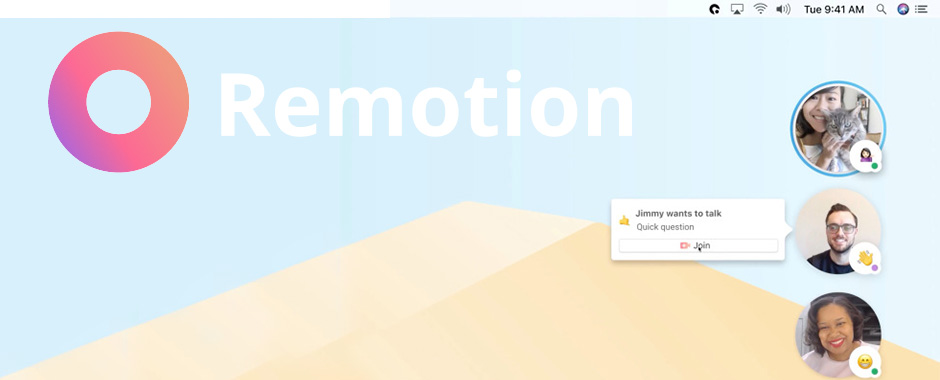
Spontaneous Videocalls
If Zoom is too formal for you – with scheduled calls, links, and passwords – the next generation of videoconferencing tools may bring pop-up, spontaneous F2F conversations to your desktop. Remotion, a free Mac app launched earlier this month, wants to “unlock spontaneous live conversation on a team” by putting the faces of your coworkers in a dock that doesn’t obscure your workspace, but lets you feel like they’re visible just over the cubicle wall. Fast Company
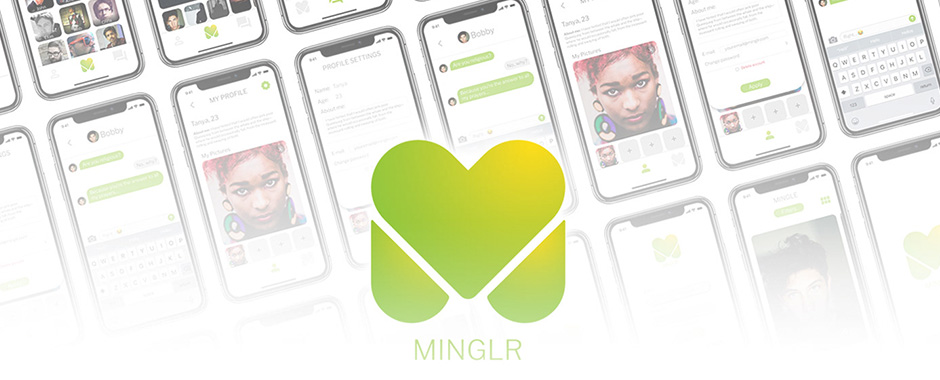
Virtual Hallway Conversations
MIT researchers have unveiled an experimental browser-based app called “Minglr” which can run in parallel to videoconferences, and permits spontaneous networking and side-videochats – “the proverbial hallway conversations.” Pairing people up at random, or matching them based on interests, are features some users have suggested and might be particularly welcomed by introverts. Rather than launch the product themselves, they have made it open source and hope that Zoom and Teams will implement it. MIT Sloan
“From a collective intelligence standpoint, lots of research suggests that those random encounters are key to creative innovations in cities, research labs, companies, and elsewhere… They are also critical to making new professional connections, forming social bonds, and building camaraderie in a group.” – Thomas Malone, Director, MIT Center for Collective Intelligence
Reinventing Facebook?
Ironically, higher ed finds itself suddenly in need of a Facebook that isn’t actually the Facebook we know today – a closed social networking community for students…

Self-Managed Student Community
The student union at Swinburne U (Australia) has partnered with Jumbea to create a peer-to-peer private community for students to meet and interact virtually. They say it “replaces emails and notice boards with an intuitive platform designed to encourage interaction and student engagement,” and that “Jumbea is where the magic of education happens and students make the most of their campus experience.” Jumbea combines course timetables and extracurricular events, student union news and direct communication, and provides group chats for student clubs, collectives, study groups and classes. Swinburne
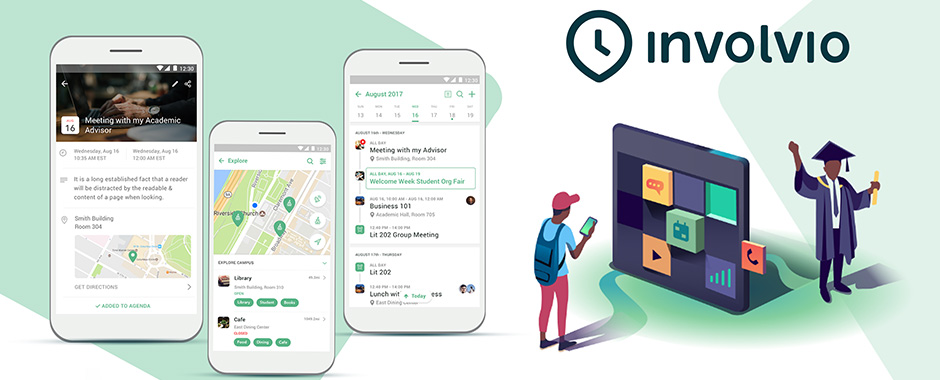
Co-Curricular Involvement App
Vancouver Island U has a co-curricular record (CCR) mobile/desktop app from Involvio which delivers “personalized experiences” using AI, and creates “new avenues for communication” between students, faculty and staff. Students can submit CCR reflections, search for new co-curricular activities, access information about wellness, the student union and athletic events, discounts and more. This week, VIU is encouraging students to share photos of their #selfcare strategies for World Mental Health Day. VIU
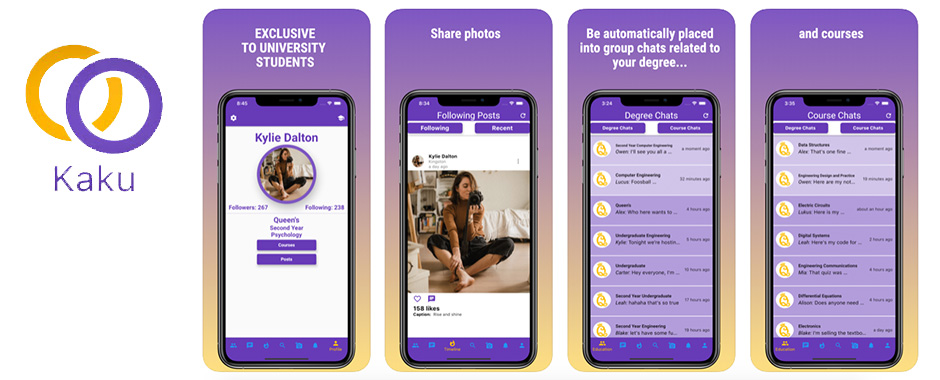
Queen’s Student Builds an App
Eric Fillion, a fourth-year computer engineering student at Queen’s U, created a smartphone app last year to likewise create overlapping group chats for students virtually. “Kaku” (Japanese for “to write”) is available on iOS and Android, and organizes users by program- and course-specific chats, where they can share photos, send direct messahes, search for other students and create custom chat groups. The app went public Jul 23 and already has hundreds of users among Queen’s undergrads – and the App Store page says “more universities are coming soon.” Kingston Whig-Standard
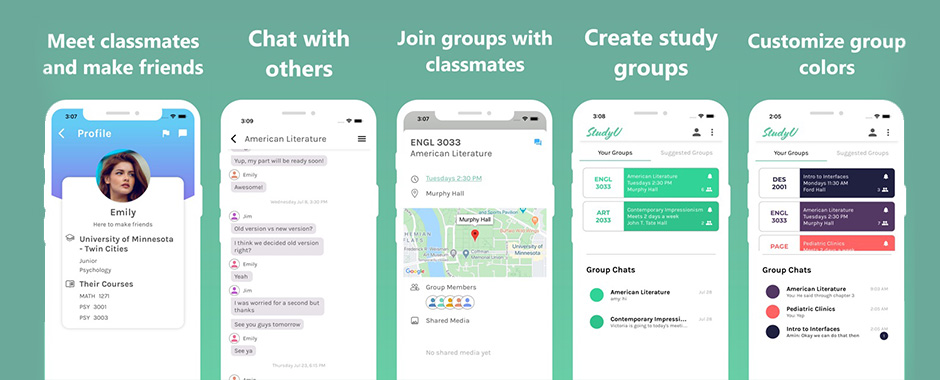
uMinnesota Students Build an App
StudyU is yet another mobile app built by 2 students from uMinnesota, to streamline meeting fellow students (“without any social anxiety”) and facilitate creating study groups. US News
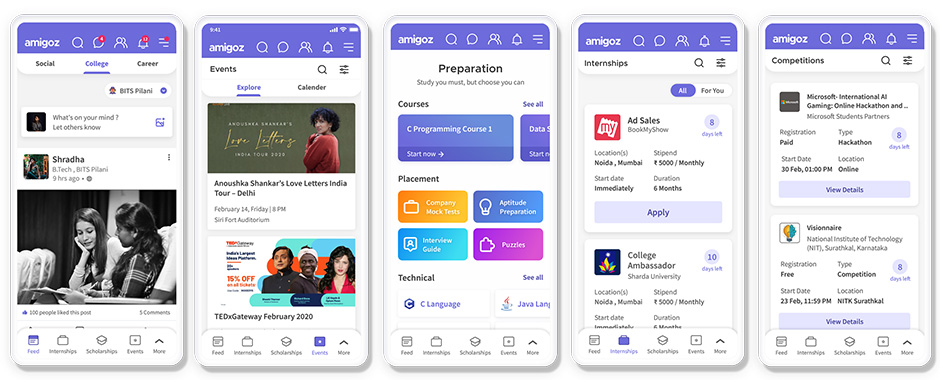
Amigoz and Internships
Another “college social network” recently launched is “Amigoz,” from India (currently available only on Android, but iOS “will shortly be available”). The platform maintains a college directory, allows friend requests, DMs and chat, and status updates (sounds familiar), plus internship opportunities, events and hackathons in your area, scholarships that match your profile, “mock tests and previous papers” for placement exams. Amigoz claims 30,000 downloads in its first 25 days, and is recruiting student ambassadors to help promote the platform. Amigoz
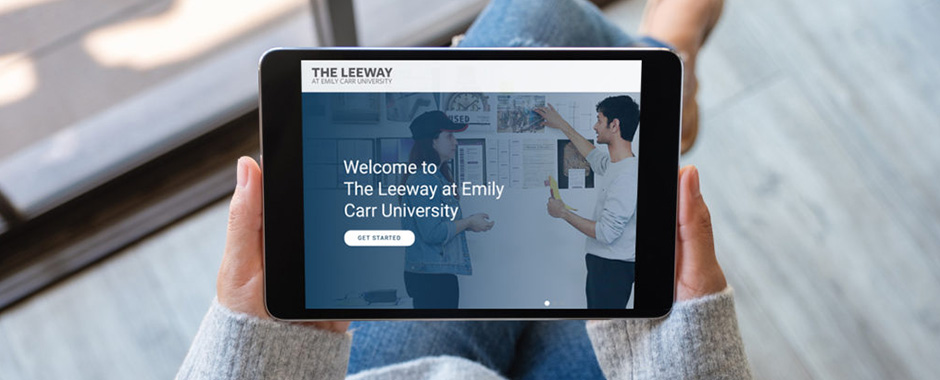
Alumni Social Networks
Emily Carr U has launched “The Leeway,” an alumni engagement tool powered by Graduway to encourage interactions within a graduating class or discipline, and between alumni mentors and current students.
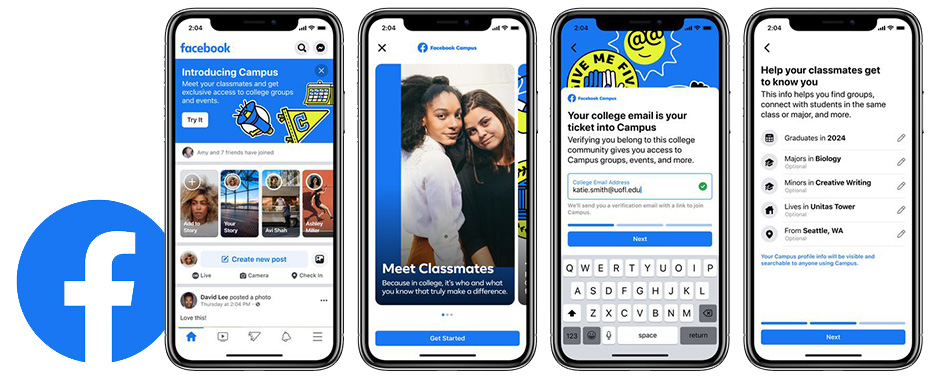
Facebook Heads Back to Campus
Considering that “The Facebook” launched from a Harvard dorm in 2004, it’s ironic that the platform has outgrown its usefulness for undergraduates, ever since their extended families friended them. Last month, Facebook launched “Facebook Campus,” a walled garden within the Facebook ecosystem that is reserved for students at 30 US colleges (to start). They claim students can create study groups, plan virtual concerts or ask for advice – and the platform will not include advertising in its news feed. Fast Company
#ICYMI
And since we’re talking about the importance of students’ social experience on campus, here’s a noteworthy new vid…
Discover Life in Residence at Brescia UC
Brescia UC (affiliated with Western U) has released a slick, upbeat 50-sec video depicting life in the beautiful Clare Hall residence – although it also feels like the first in what might be a series of new recruitment ads. Psych student Savannah narrates a fast-paced tour with plenty of (pre-pandemic) vignettes of students enjoying life on campus. Nice! YouTube
Thanks for reading! Stay safe and be well.

All contents copyright © 2014 Eduvation Inc. All rights reserved.